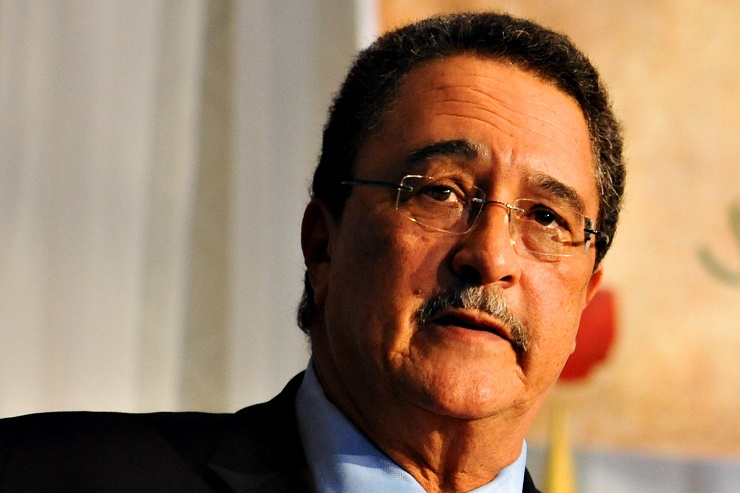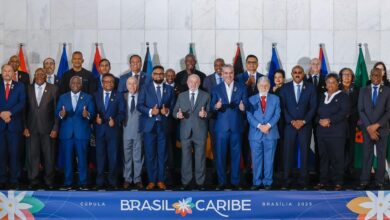“Unless we can get the countries that are the major emitters of green house gases to commit to more ambitious reductions, the Caribbean will be confronted with more extreme storms and hurricanes, more frequent and prolonged droughts, dangerous sea-level rise that will wash away roads, homes, hotels, and ports in every island; greater food insecurity and more acidic oceans that will kill our corals, damage our fish stock and negatively impact our tourism industries.”
These sentiments were expressed by Dr. Kenny Anthony, Prime Minister of Saint Lucia and CARICOM’s Lead Head of Government on Climate Change and Sustainable Development, in a statement ahead of the 21st Conference of the Parties (COP21) to the United Nations Framework Convention on Climate Change (UNFCC) which takes place in Paris, France from 30 November-11 December 2015.
Heads of State and Government, Ministers responsible for the environment, Ministers of Foreign Affairs, scientists and other stakeholders are coming together in Paris to negotiate a new global climate change agreement.
Caribbean Community negotiators have been working assiduously in several meetings leading up to Paris to emphasize that temperature increase below 2 degrees Celsius above pre-industrial levels is still inadequate for protecting ecosystems in Small Island and Low-Lying Developing States, (SIDS) from the adverse impact of climate change. They will continue this advocacy in Paris to advance the position that the goal for average long-term global temperature increase should be no more than 1.5 degrees, a level necessary for the mere survival of SIDS.
Chairman of the Caribbean Community, The Rt. Hon. Fruendel Stuart, Prime Minister of Barbados in his statement ahead of the Conference, said:”We stand on the edge of a precipice.
Climate change threatens the very existence of many Small Island and low-lying coastal states in the Caribbean and around the world. Amongst other things, climate change has already caused extreme weather events, coastal erosion and changes in weather patterns that have had tragic consequences in our region and beyond…The international community has a chance to address this existential threat by coming together in Paris.”
He recognized the leadership Caribbean countries have exhibited in developing a common framework to support the transformation of their energy systems by adopting ambitious national strategies to reduce greenhouse gas emissions.
“We are now looking to the international community, with the developed countries taking the lead, to work with urgency and purpose to achieve an ambitious, comprehensive and meaningful outcome in Paris,” the Chairman stated, echoing the CARICOM Declaration on Climate Change issued at the July 2015 Regular Meeting of the Conference of Heads of Government of CARICOM.
CARICOM Member States are part of a group of Small Island Developing and low-lying coastal States (SIDS) that are extremely vulnerable to the impacts of climate change. Recognising the importance of the issue, the Community established a Task Force on Sustainable Development in 2013 led by Dr the Honourable James Fletcher Minister with responsibility for Public Service, Information, Broadcasting, Sustainable Development, Energy, Science and Technology of Saint Lucia.
This Task Force guided the involvement of the Community through briefs along with the formulation and reviewing of the region’s negotiating positions. CARICOM Secretary-General Ambassador Irwin La Rocque praised the “excellent work of this Task Force.” Noting that the Community has been deeply engaged in the process, he pointed to the Task Force as being “responsible for the co-ordinated positions we have taken as a Community throughout these negotiations and processes.”
Scientific information including the most recent report of the Intergovernmental Panel on Climate Change (IPCC) indicates that the high levels of green house gases in the atmosphere are causing the temperature of the planet to increase to dangerous levels. At the current levels, the planet is on track for an almost 4 degrees Celsius increase by the end of the year 2100.
This is regarded as extremely alarming to SIDS since the science confirms that the window of opportunity to hold temperature increase below two degrees centigrade or below one point five degrees centigrade above pre-industrial levels is rapidly closing. The IPCC report also indicates that there may be only six years to go before either goal is overrun. This would limit the capacity of SIDS to adapt to climate change. Some may even lose adaptation options altogether.
Dr. Anthony said CARICOM Heads of Government are anticipating a robust, comprehensive legally binding Paris Agreement that commits all countries to limiting the long temperature increase to no more than 1.5 degrees Celsius above pre-industrial levels. He said CARICOM will also advocate for:
- the retention of the principal of special circumstances and unique vulnerability of SIDS;
- five-year review cycles of green house gas emission reduction targets with the first review to take place prior to 2020, to allow for the adjustments necessary to achieve the goal of 1.5 degrees;
- recognition of loss and damage (the irreversible, slow onset impacts of climate change to which it is not possible to adapt, example sea-level rise and ocean acidification) as a critical issue for SIDS and the development of a mechanism to address this element, treated separately from adaptation;
- support for REDD+ (efforts to reduce emissions from deforestation and forest degradation and the sustainable management of forests);
- adequate provisions for adaptation to help Caribbean countries reduce their vulnerability to effects of climate change and develop great climate resilience where possible; and
- commitment by developed countries to take the lead in scaling up the provision of adequate, predictable and new sources of financing for mitigation, adaptation, loss and damage, and for technology support.
Importantly, Dr. Anthony said CARICOM will seek to ensure that there is no reneging on the commitment to provide US100 Billion from 2020 to assist vulnerable countries to cope with the impact of climate change.
Secretary-General LaRocque made the point that for the Region, global temperature rise of not more than 1.5 degrees centigrade is not an academic exercise. “This is a matter of survival for many CARICOM SIDS. Time is running out. Climate Change is here and impacting the Region. We, in the Caribbean Community are living it through unusual weather patterns and intensified climatic events. We have seen it in Saint Lucia, in St Vincent and the Grenadines, in Dominica and in The Bahamas and in the impact of extreme events over the past few years,” he added.
CARICOM is going into the COP21 with high expectations that the international community would listen to our concerns and act appropriately.





